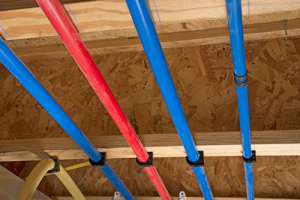 How To Maintain PEX Piping During The Winter In Houston
How To Maintain PEX Piping During The Winter In Houston
Here at TDT Plumbing, we recognize the critical significance of safeguarding your plumbing infrastructure, particularly PEX pipes, against the harsh conditions of winter to thwart freezing and mitigate potential damage. In this comprehensive article, we aim to equip you with expert insights and practical recommendations on how to proficiently winterize your PEX pipes. By adhering to these strategies, you can fortify your plumbing system against the perils of cold weather, ensuring its resilience and reliability throughout the winter months.
As the temperatures drop and the risk of frozen pipes escalates, it becomes paramount to take proactive measures to protect your PEX pipes from potential damage. With our guidance, you’ll gain invaluable knowledge on the best practices for winterizing your plumbing system, allowing you to navigate the challenges of winter with confidence and peace of mind. Let us empower you to safeguard your PEX pipes effectively, preserving their longevity and functionality even in the most frigid conditions.
Understanding the Risks:
Before winterizing your PEX pipes, it’s essential to understand the potential risks associated with freezing temperatures:
- Freezing water inside PEX pipes can cause them to expand and burst, leading to costly repairs and water damage.
- PEX piping, although durable, is susceptible to damage if exposed to extreme cold temperatures.
Taking proactive steps to winterize your PEX pipes can help mitigate these risks and protect your plumbing system from potential damage during the winter months.
Insulation:
Insulating your PEX pipes is crucial to prevent freezing and maintain optimal temperatures. Follow these steps to properly insulate your pipes:
- Identify any exposed PEX pipes in unheated areas such as basements, crawl spaces, or attics.
- Wrap exposed pipes with foam pipe insulation or heat tape to provide an additional layer of protection.
- Pay attention to areas near exterior walls or drafty spaces, as they are more prone to freezing.
- Insulate outdoor faucets and hose bibs to prevent freezing and bursting.
Proper insulation is key to protecting your PEX pipes from freezing temperatures and potential damage, ensuring that your plumbing system remains functional throughout the winter.
Temperature Maintenance:
Maintaining a consistent temperature inside your home is key to preventing PEX pipes from freezing. Here’s what you can do:
- Keep your thermostat set to a reasonable temperature, even when you’re away from home.
- Open cabinet doors under sinks and vanities to allow warm air to circulate around pipes located inside.
- Consider using space heaters in areas where pipes are at risk of freezing, such as basements or crawl spaces.
By maintaining a consistent temperature inside your home, you can help prevent freezing and ensure that your PEX pipes remain in optimal condition throughout the winter season.
Preventative Measures:
Taking proactive measures can help minimize the risk of frozen PEX pipes and potential damage:
- Drain your plumbing system and shut off the main water supply if you plan to be away from home for an extended period during the winter.
- Periodically inspect your PEX pipes for signs of damage, leaks, or corrosion, and address any issues promptly.
- Consider installing a leak detection system to alert you to potential problems before they escalate.
By implementing these preventative measures, you can help protect your PEX pipes from freezing temperatures and potential damage, ensuring the reliability of your plumbing system.
Professional Assistance:
If you’re unsure about how to properly winterize your PEX pipes or if you encounter any issues during the process, don’t hesitate to seek professional assistance. Our team of experienced plumbers at TDT Plumbing is here to help.
- We specialize in residential and commercial plumbing services, including pipe installation, repair, and maintenance.
- Contact us today to schedule a consultation and ensure that your PEX pipes remain in top condition throughout the winter season.
Seeking professional assistance can provide peace of mind and ensure that your PEX pipes are properly winterized, protecting your plumbing system from potential damage during the colder months. At TDT Plumbing, we’re committed to helping you safeguard your pipes and enjoy uninterrupted plumbing functionality throughout the winter season.
FAQs – Winterizing PEX Pipes In Houston
Can I use regular foam insulation to protect my PEX pipes during winter?
Yes, foam pipe insulation is an effective way to protect PEX pipes from freezing temperatures. Make sure to choose insulation with an appropriate thickness and R-value for your climate.
How do I know if my PEX pipes are properly insulated?
Check for any exposed areas of piping in unheated spaces such as basements, crawl spaces, or attics. If you find any, wrap them with foam pipe insulation or heat tape to ensure adequate protection against freezing.
Is it necessary to insulate outdoor faucets and hose bibs in the winter?
Yes, outdoor faucets and hose bibs are susceptible to freezing and bursting in cold temperatures. Insulating them with foam covers or heat tape can prevent damage and ensure they remain functional throughout the winter.
Can I leave my thermostat set to a lower temperature to save energy during the winter?
While it’s tempting to lower your thermostat to save energy, it’s important to maintain a consistent temperature inside your home to prevent PEX pipes from freezing. Keep your thermostat set to a reasonable temperature, even when you’re away from home, to ensure your pipes remain protected.
What should I do if I suspect my PEX pipes have frozen?
If you suspect your PEX pipes have frozen, it’s crucial to act quickly to prevent bursting and water damage. Turn off the main water supply to your home, and use a hair dryer or space heater to thaw the pipes slowly. If you’re unsure or unable to thaw the pipes yourself, contact a professional plumber for assistance.
How often should I inspect my PEX pipes for signs of damage or leaks?
It’s a good idea to inspect your PEX pipes at least once a year, preferably before the onset of winter. Look for any signs of damage, leaks, or corrosion, and address any issues promptly to prevent further damage and ensure the integrity of your plumbing system.
Can I winterize my PEX pipes myself, or should I hire a professional plumber?
While some homeowners may feel comfortable winterizing their PEX pipes themselves, others may prefer to hire a professional plumber to ensure the job is done correctly. If you’re unsure or have any concerns about winterizing your pipes, it’s always best to seek professional assistance to avoid potential problems down the line.
If you have any more questions about winterizing your PEX pipes or if you need assistance with any plumbing concerns, don’t hesitate to reach out to us at TDT Plumbing. Our team of experts is here to provide guidance, answer any inquiries you may have, and ensure that your plumbing system remains in top condition throughout the winter season and beyond. Contact us today for all your plumbing needs!
